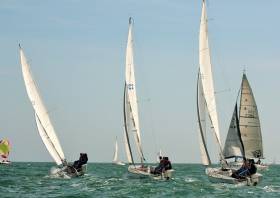Displaying items by tag: Corporate Sailing
Corporate Sailing League Launched on Dublin Bay
Do you tell your friends or work colleagues all about your sailing adventures? Do they ask when you will bring them sailing or racing? Kenneth Rumball of the Irish National Sailing School thinks he may have the answer for you. The Irish National Sailing and Powerboat School is launching its all new Corporate Sailing League on Dublin Bay, the aim of which is to provide intercompany competition and networking through sailboat racing as a team on board a proven 1720 Sportsboat.
Our fleet of six 1720s are all identical having this year gone through a considerable refit. Therefore, the winning boat will be the one sailed to the best meaning teamwork is key to sucess. Our hope is that a keen competent sailor from a company will sell the idea to four of his colleagues to create a team of five to go racing against other companies and teams. For those teams that need some extra help, we will run a full training evening with the boats and if required provide a competent skipper/instructor as part of the team.
Sailing has proven globally how the sport can encourage teamwork amongst teams on the same craft while also providing great competition especially in one design boats which leads to great networking opportunities once back ashore after racing.
A series of short races will take place over five Tuesday evenings throughout the summer, 23rd May, 20th June, 18th July, 22nd August, 19th September. It is not necessary for the same team members or leaders to be present on each evening just make sure your company is represented! Racing will start at 1930 giving teams plenty of time to get out of the city to go sailing.
Après Sail: Growing and expanding business is hugely dependant on connections, forging new relationships, maintaining and building on existing contacts. Sailing is used worldwide by many of the elite companies in all sectors for this purpose. With many managing directors, CEOs and top businessmen sailing for pleasure and to keep business contacts alive. We see our new product essential for this purpose allowing up and coming associates in growing companies getting a step ahead to form new relationships. There will be a meal or BBQ after every evenings racing to facilitate this.
How does a company benefit? Any company can benefit hugely from this program by giving their employees the chance to form new business contacts and connections while also enhancing teambuilding on a thoroughbred race boat. In addition for every company that signs up to our program, we will get signs made with your company’s logo proudly displayed on our boats to give maximum visibility to a wide range of decision makers who sail regularly on Dublin Bay.
The cost of the programme is €1,500 per team






























































